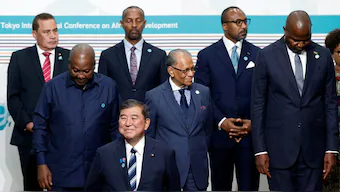A cultural initiative meant to foster friendship and cooperation between Japan and Africa has unexpectedly ignited fierce debate at home. What began as a symbolic program has now escalated into a flashpoint for deeper social anxieties in Japan.
Earlier this year, Tokyo introduced a “hometown partnership” program with four African nations. The project was designed as a gesture of cultural diplomacy—encouraging exchange in education, arts, and community projects between select Japanese towns and African counterparts. Officials envisioned it as a way to showcase shared heritage, promote tourism, and strengthen Japan’s relationship with Africa in an era where both regions are seeking new economic and cultural bridges.
But within weeks of its launch, misinformation began circulating online. Rumors falsely claimed that Japan was “giving away cities to Africa” or issuing “special immigration visas” that would open the doors to mass African migration. These claims, though unfounded, spread rapidly on social media and were picked up by nationalist commentators.
The backlash grew louder, tapping into Japan’s long-standing anxieties over immigration, identity, and cultural preservation. For decades, Japan has prided itself on being a relatively homogeneous society. While demographic decline has forced Tokyo to reconsider its stance on immigration, public opinion remains divided—particularly when it comes to welcoming communities from Africa and the Global South.
Prime Minister Shigeru Ishiba, who endorsed the exchange as a forward-looking move to deepen Japan’s global engagement, now finds himself at the center of the storm. Critics accuse his government of being “reckless” with national identity, while supporters argue that Japan must embrace multicultural ties if it hopes to remain competitive in an increasingly interconnected world.
This uproar reflects more than just confusion about the program. It reveals Japan’s internal struggle to reconcile its shrinking population with the demands of a globalized economy, as well as the prejudices that surface when Africa is placed at the heart of the discussion.
For Africa, however, the symbolic program represents an important opening. In recent years, Japan has sought to expand investment, development aid, and security cooperation across the continent. Cultural diplomacy is one more avenue for strengthening those ties. Despite the controversy in Tokyo, many African observers see the program as a recognition of Africa’s growing importance on the world stage.
The outcome of this debate in Japan could shape the future of Afro-Japanese relations. Will Tokyo push forward with bold partnerships, or retreat in the face of domestic resistance? As the dust settles, one thing is clear: Africa’s cultural and geopolitical weight is forcing even the most traditional societies to reckon with a rapidly changing world.

Leave a Reply